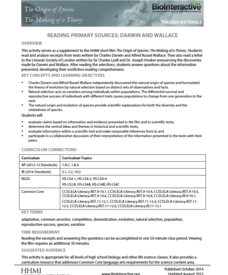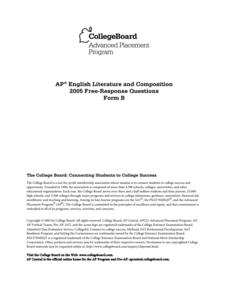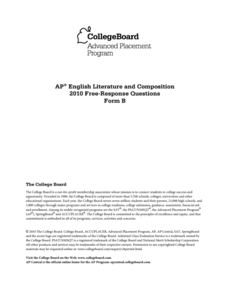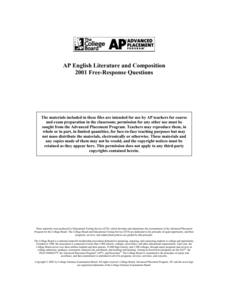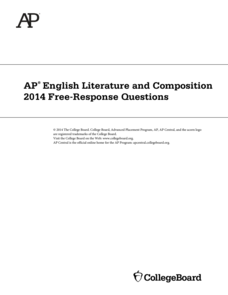NOAA
Animals of the Fire Ice
When the sun's rays can't reach the producers in a food web, where does all the energy come from? Extreme environments call for extreme food sources. Young scientists investigate creatures that appear to get their energy from methane...
Space Awareness
Valleys Deep and Mountains High
Sometimes the best view is from the farthest distance. Satellite imaging makes it possible to create altitude maps from far above the earth. A three-part activity has your young scientists play the role of the satellite and then use...
George W. Bush Presidential Library and Museum
Teaching Primary and Secondary Sources
What makes a source primary or secondary? Middle schoolers read a definition of each term before exploring different examples and applying their knowledge to a research project.
NOAA
A Quest for Anomalies
Sometimes scientists learn more from unexpected findings than from routine analysis! Junior oceanographers dive deep to explore hydrothermal vent communities in the fourth lesson in a series of five. Scholars examine data and look for...
Centers for Disease Control and Prevention
Major Disparities in Adult Cigarette Smoking Exist Among and Within Racial and Ethnic Groups
Data indicates that some racial groups smoke more than others, and that with that racial group, there are smaller groups whose smoking habits vary as well. Secondary learners read a graph that details the differences between the Asian...
Howard Hughes Medical Institute
Scientific Inquiry Using WildCam Gorongosa
How do scientists determine what questions to ask to meet their research goals? Help your class develop an inquiry mindset with a lesson based on studies in the Gorongosa National Park. Partners create their own research questions by...
Howard Hughes Medical Institute
Developing an Explanation for Mouse Fur Color
Whether or not you think mice are nice, you'll love the colorful activity! Scholars examine evidence for evolution in the rock pocket mouse through video, discussion, and collaborative work. Learners watch a video regarding variation in...
Howard Hughes Medical Institute
The p53 Gene and Cancer
Is understanding the p53 gene the key to kicking cancer? Introduce a most-important protein through a presentation with colorful diagrams, simulations, and brief lectures. Viewers discover how p53 works, the cellular processes it...
Howard Hughes Medical Institute
Reading Primary Sources: Darwin and Wallace
Take your classes back in time. Learners read real historical texts from both Darwin and Wallace as well as an announcement of their findings. Using guiding questions, they make inferences and draw conclusions from the information in the...
College Board
AP® English Language Special Focus: Using Sources
What is the most effective way to teach scholars how to write a research paper? Educators explore the topic with the AP® English Language and Composition exam resource. The reference material guides teachers in best practices for using...
College Board
AP® English Language: Reading and Writing Analytically
How can teachers ensure their pupils are well prepared for the AP® English exam? The reference material is a good place to start! Educators read seven essays detailing best practices for teaching scholars to read critically and write...
College Board
2006 AP® English Literature and Composition Free-Response Questions Form B
It is not about where you are going, but the journey to get there. Scholars choose a play or novel in which a character takes a journey. They then create essays describing what the journey meant to the overall piece of work. Learners...
College Board
2005 AP® English Literature and Composition Free-Response Questions Form B
Does more power make you more important? Test takers ponder the question as the 2005 AP® English Literature and Composition Free-Response Questions Form B asks scholars to take a close look at power by writing thoughtful essays. Writers...
College Board
2010 AP® English Literature and Composition Free-Response Questions Form B
Home is where the heart is. The 2010 AP® English Literature and Composition Free-Response Questions Form B require scholars to think about what home really is. They look at how a character leaves home, yet home remains within the...
College Board
2001 AP® English Literature and Composition Free-Response Questions
Do 100 years make a difference? Scholars compare two poems written 100 years apart. They also analyze characterization used in a passage from Tom Jones by Henry Fielding. A final essay question allows writers to choose a piece of work...
College Board
2002 AP® English Literature and Composition Free-Response Questions
Good or evil? Some characters never identify themselves as either. Scholars create essays in which they examine morally ambiguous characters. Writers also analyze and write essays about the use of poem titles and take a close look at the...
College Board
2006 AP® English Literature and Composition Free-Response Questions
Scholars select a novel or play and then craft an essay that describes the setting's role in the story. Pupils also create essays that analyze a poet's use of language and the values of characters in a novel excerpt.
College Board
2001 AP® English Language and Composition Free-Response Questions
Do pictures really last longer? A prompt from the 2001 AP® English Language and Composition Free-Response Questions asks scholars to analyze the opinion that photography actually limits people when it comes to understanding the world....
College Board
2002 AP® English Language and Composition Free-Response Questions
It is not what you say but how you say it. Scholars use an essay prompt from the 2002 AP® English Language and Composition Free-Response Questions to analyze how an author uses language to describe her past. They also support or argue a...
College Board
2004 AP® English Language and Composition Free-Response Questions Form B
Are there unspoken rules everyone should follow? Questions from the 2004 AP® English Language and Composition Form B ask scholars to give opinions on how unspoken rules help people belong in society. Pupils also analyze a writer's...
College Board
2014 AP® English Literature and Composition Free-Response Questions
How much would you give up for others? The last prompt in 2014 AP® English Literature and Composition Free-Response Questions asks scholars to write essays about a character in a piece of work that has sacrificed and what the sacrifice...
College Board
2007 AP® English Language and Composition Free-Response Questions
Looking to stretch the minds of your scholars? The 2007 AP® English Language and Composition Free-Response
Questions offer readers the opportunity to respond to reading at a higher level than many other high school resources. Writers...
College Board
2005 AP® English Language and Composition Free-Response Questions
Should people only have what they need? Questions from the 2005 AP® English Language and Composition Free-Response section asks scholars to write essays evaluating the argument that those who are more fortunate should give all excess...
Roald Dahl
James and the Giant Peach Lesson Plans
Immerse yourself in the world of giant bugs, rolling peaches, and brave little boys with an interdisciplinary unit on James and the Giant Peach. Young readers focus on the scientific themes of Roald Dahl's classic novel with bug hunts,...










